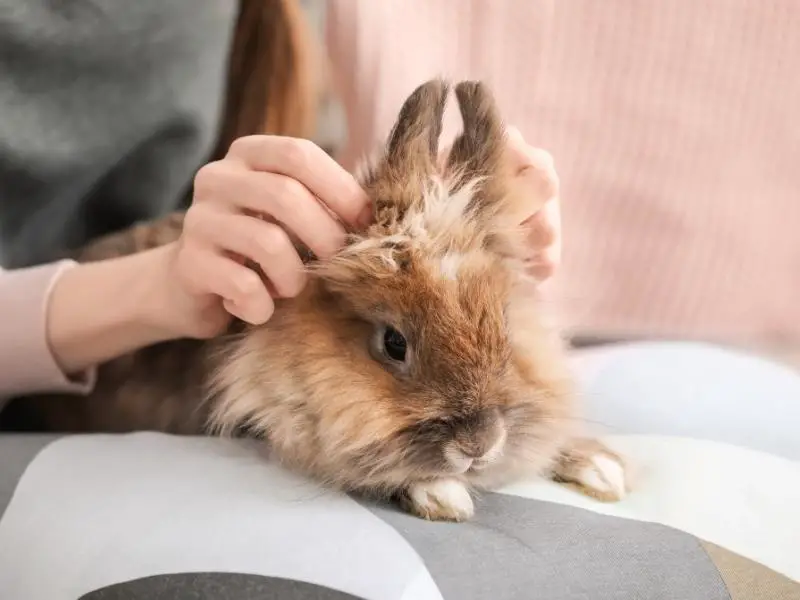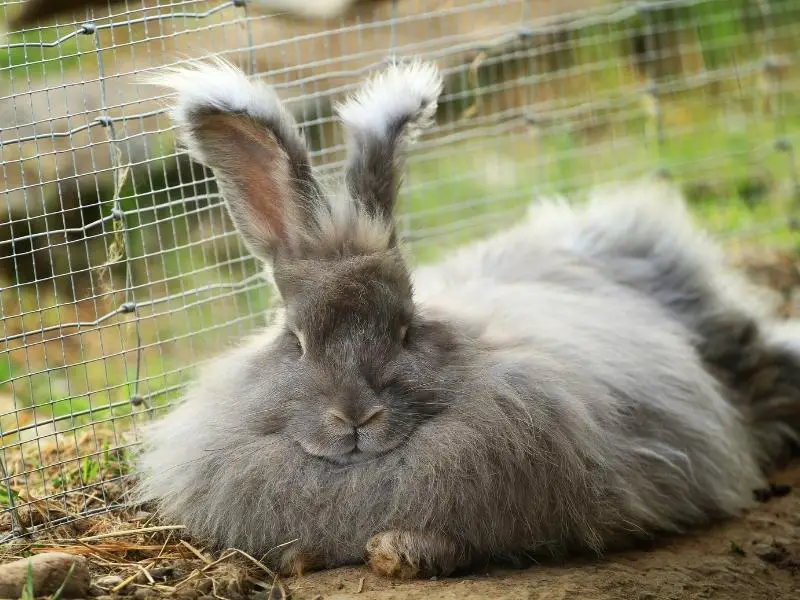Has your calm and loving female bunny suddenly become moody and agitated? Is she experiencing PMS (premenstrual syndrome)? You may be wondering if she could be in heat, and this begs the question:
Do female rabbits have periods?
Female rabbits don’t have periods or menstrual cycles as they’re Induced Ovulators (ovulation occurs due to external stimuli). Unlike other female mammals (such as dogs or cats), rabbits experience irregular estrous cycles (cycle between one ovulation and the next) when they sexually mature.
If you have a young doe (female rabbit) or need more information about female rabbits in heat, this guide will provide you with all the information you need.
Do Female Bunnies Bleed in Heat?

Female rabbits don’t bleed when they’re in heat.
Rabbits are prey animals, and unfortunately, they don’t survive for very long in the wild. That’s why it’s a rabbit’s instinct to breed and secure the existence of their species. Therefore, does (female rabbits) are permanently in a heat cycle.
Your bun will reach her first heat cycle as early as 4 months (when she reaches sexual maturity). A rabbit will stay in heat until she is a more senior bunny.
However, as your bun ages, she will experience heightened and lessened bouts of sexual activity.
Red rabbit urine is often confused with menstrual blood. Here’s a closer look at a few reasons that may cause your female rabbit to have red-tinged urine:
Diet
If your floppy-eared friend has eaten too many carrots or spinach, this can give their urine a reddish tinge. This color is due to the high levels of beta-carotene.
Other food types that can cause a red tinge to include:
- Dandelions
- Cabbage
- Broccoli
- Strawberries
- Red berries
High Levels of Calcium
If your bun’s diet contains high calcium levels, it can develop into a fatal condition known as calciuria. Calcium deposits can block the urethra’s opening and cause excruciating pain and discomfort for your bun.
Your bun will struggle to pass urine, and the small amount they pass will be tinged with blood.
If you suspect your rabbit has calciuria, you must take them to a vet immediately, as this condition can cause kidney damage and failure.
Course of Antibiotics
Another reason a rabbit’s urine turns red is if your bun is on antibiotic treatment. The urine can sometimes turn a bright red, but this should fade once the antibiotic course is complete.
Signs That Your Rabbit Is in Heat
If your bun is in heat, it’ll undergo physical and personality changes. You’ll know if your rabbit is in heat by the following signs:
- Your sweet bun suddenly becomes territorial and aggressive when you approach her or try to pet her.
- She starts marking her territory with her urine and poop balls. While she is in heat, the odor can be pretty strong.
- Your bun may be restless and irritable. She might run around her hutch and chew on the cage.
- Female rabbits will mount objects or other rabbits when they’re sexually frustrated.
- A clear sign that your bun is on heat is when her vulva is more visible (swollen) and seems darker than usual.
- Your rabbit might be more affectionate than usual.
Did you know? Rabbits will continue to reproduce into their old age, unlike humans who experience menopause and can no longer ovulate.
How to Take Care of Your Rabbit When in Heat
Your long-eared companion is a domesticated rabbit, which means there is no need for them to reproduce to ensure the survival of their species.
Unfortunately, there is not much you can do to relieve the frustrating effects of a heat cycle for your bun except to have them sterilized.
By spaying your doe, you are lowering the chances of her developing uterine cancer and balancing her hormones. Your bun will no longer feel the instinctive need to mate and procreate, leaving them feeling calmer.
Let’s take a look at how you can care for your rabbit after they’ve been spayed:
1. Keep your bun comfortable and warm.
2. Try not to handle your bun as it’ll be uncomfortable and in pain.
3. Administer any antibiotics or medication as per the vet’s instructions.
4. Keep your buns’ living environment clean to avoid wound infection.
5. Ensure easy access to fresh food and water.
6. Keep your bun separate from male rabbits until she is healed.
How Long Is a Rabbit’s Period?
Rabbits don’t experience a menstrual cycle or period like other female mammals. Your doe will ovulate after they’ve mated with a suitable mate, whereas other females experience ovulation before mating.
Your bun has an estrous cycle (which doesn’t run on a regular cycle like a menstrual cycle). A doe will be in a full heat cycle for 5 to 14 days (a period of responsiveness), followed by around 2 days where she won’t want to mate.
If no mating takes place, the female rabbit’s body will reabsorb the endometrium lining, and the cycle will repeat until she has been successfully impregnated.
Your bunny is an Induced Ovulator, which means they ovulate due to external stimuli such as:
- Pheromones
- The act of coitus (or mating)
- Visual stimuli
- Masturbation on objects
- Genital stimulation
Once your bun has kindled (birthed) a litter, the estrous cycle will begin again, and she can fall pregnant within 12 hours (because of induced ovulation).
My Last Bunny Thoughts
Your floppy-eared friend doesn’t have periods like other female mammals, but they certainly have the hormones that go along with it. Your doe will let you know when she’s in heat, especially with her moody behavior.
If your bun has a bunny partner, you may notice agitated behavior from both of them as things can get quite “heated” when a doe is in heat.
Unless you’re breeding rabbits, it’s a good idea to consider having your doe spayed. This will help your rabbit deal with all the raging hormones that come with a heat cycle.
By sterilizing your bun, you’re giving her a chance at a longer life and a healthier one (female rabbits can develop uterine tumors once they’re sexually mature).
Your sweet bunny doesn’t need to fulfill the need to procreate. Your doe is a domestic bunny who deserves a happy and stress-free life with you and your family.
Related Articles:

